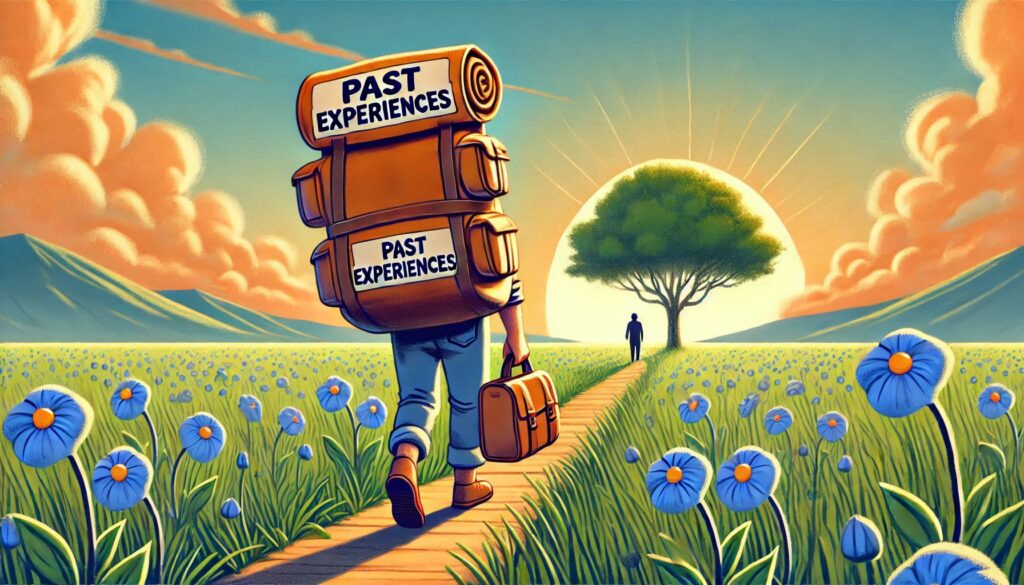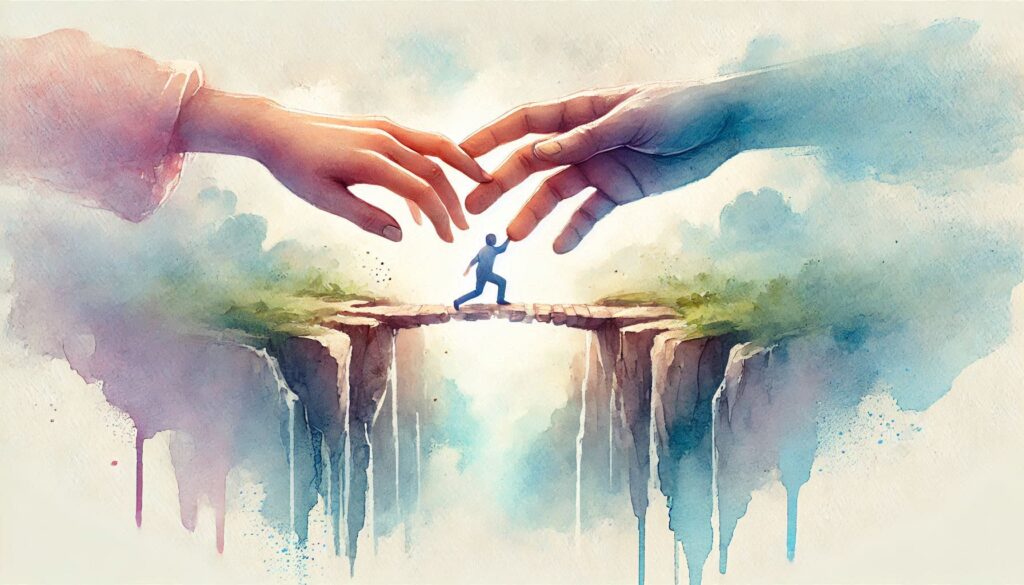
Introduction
Have you ever caught yourself questioning the very foundation of your relationships, wondering if the comfort of certainty is even possible in a world full of unknowns? The fear of betrayal or loss can be paralyzing, leaving us gripped by doubts and insecurities. It’s a feeling many of us know all too well—the constant need for reassurance that those we trust won’t break us, that the connection we’ve built is genuine, and that we won’t be left picking up the pieces when it all falls apart.
Yet, there’s a certain beauty in acknowledging these fears, for they open the door to a deeper understanding of ourselves. Our struggles with trust don’t just reveal the fragility of our relationships; they highlight the complexity of our emotions and past experiences. This blog post isn’t about offering solutions or concrete answers. Instead, it’s a journey of self-awareness—one that explores the tension between our desire for certainty and the realities of human connection. Here, we’ll simply share an honest reflection on this internal conflict, and perhaps, find comfort in knowing we’re not alone in it.
The Need for Certainty: A Double-Edged Sword
Humans have an innate need for certainty, especially in relationships. At its core, this desire stems from our biological wiring—our evolutionary survival instinct. For centuries, humans have relied on stable, secure connections to ensure survival. In the past, trusting a mate or group meant greater protection, better resources, and emotional stability. Today, this need manifests as a deep-seated desire for assurance that those we love are committed and loyal. We want proof that the connection is real, lasting, and safe.
However, this craving for certainty can quickly become a double-edged sword. While it’s natural to seek security in relationships, the constant need for proof can lead to unhealthy dynamics. It’s easy to slip into a pattern of overthinking, questioning every action, and looking for signs of betrayal—real or imagined. What may seem like a harmless inquiry or innocent concern often morphs into controlling behavior, as we subconsciously try to “lock down” the outcome.
The emotional cost of this need for certainty can be steep. Anxiety becomes a constant companion, as we live in fear of what might go wrong. We lose sight of the present moment, consumed by hypothetical scenarios and worst-case outcomes. Over time, this can stifle intimacy. Trust is the foundation of closeness, and when we demand constant reassurance, we inadvertently push our partners away, eroding the very connection we sought to protect. In the end, the need for certainty can create a fragile, anxious bond instead of the loving, secure one we desire.

The Role of Past Experiences in Trust Issues
Our ability to trust is often shaped by the experiences we’ve had in the past. When we’ve been hurt, betrayed, or misled, our minds begin to associate new experiences with the trauma we’ve already endured. Even in the most seemingly innocent moments, the scars of previous betrayals can trigger a cascade of emotions. We might find ourselves doubting a partner’s intentions or seeing red flags where none exist—our minds drawing parallels between the present and the painful lessons learned from the past.
This tendency to project our fears onto current relationships can create a vicious cycle. Every time something feels even remotely similar to a past experience, we’re sent spiraling into doubt, often without giving our partner a fair chance. What starts as a simple worry can quickly escalate, feeding on insecurities and mistrust. The more we engage in this cycle, the harder it becomes to break free, and the relationship suffers as a result.
But amidst all this turmoil lies a crucial concept: inner trust. It’s not about guaranteeing that pain will never come, but rather learning to trust ourselves to handle it if it does. When we can rely on our own strength and resilience, we stop looking for absolute certainty from others. Instead, we find peace in knowing that we have the capacity to recover, grow, and move forward, regardless of what happens in the future.
Masculinity, Betrayal, and the Fear of Vulnerability
Society has long tied masculinity to pride, strength, and control. For many, being cheated on is not just a breach of trust; it’s a blow to their sense of self-worth and identity. The idea of betrayal can feel emasculating because it challenges the deeply ingrained belief that a man’s strength lies in his ability to hold power—over situations, emotions, and even relationships. When that power is undermined by infidelity, it can feel as though everything that defines a man’s worth is stripped away.
In reality, though, the fear of betrayal and the desire for control are often fueled by toxic masculine narratives that prioritize dominance and stoicism over vulnerability and emotional connection. The idea that a man must be impervious to emotional pain creates an environment where fear of being hurt by someone you love is shameful. This expectation silences emotional expression and makes it harder to admit when we feel insecure, hurt, or vulnerable.
But true strength isn’t found in emotional armor or infallibility—it’s found in the courage to be open, to embrace vulnerability, and to trust even when it feels uncomfortable. Challenging these societal narratives means redefining masculinity as emotional openness, where vulnerability is seen not as weakness but as a powerful form of emotional intelligence. By allowing ourselves to be vulnerable, we unlock deeper connections and, ultimately, more resilient relationships.

Navigating the Fear of Uncertainty in Love
Uncertainty is an inevitable part of love, but that doesn’t mean it has to take control of your relationship. The key lies in how we approach the fear it brings. One of the most powerful tools in navigating this fear is open communication. Sharing your fears out loud—without blame or accusation—allows both partners to understand each other’s vulnerabilities and concerns. By creating a space where honesty and emotional expression are welcomed, you not only reduce the power of those fears but also reinforce the connection you share. Instead of assuming the worst, you open the door for reassurance, clarity, and a deeper understanding.
But how do you know when your fears are rooted in reality or simply the product of your own anxieties? Differentiating between actual red flags and imagined ones is essential for maintaining a healthy perspective. Red flags are behaviors that actively harm or undermine trust—dishonesty, manipulation, and disrespect. Imagined red flags, on the other hand, are often projections of past wounds or insecurities. These can take the form of innocent actions misunderstood through the lens of fear. By learning to pause and reflect before reacting, we give ourselves the opportunity to assess whether our worries are valid or just products of our overactive imagination.
Another key element in navigating uncertainty is self-love. When you trust yourself to handle whatever comes your way, external fears lose their grip. Trust in others starts with trust in your own ability to cope with challenges, should they arise. This internal foundation of self-assurance can create a sense of security that isn’t dependent on external validation or certainty.
Lastly, embracing the beauty of imperfection is essential in any relationship. No relationship is without its ups and downs, and trying to control every outcome only leads to frustration and anxiety. Instead, allow space for mistakes, growth, and unpredictability. Imperfection is where the magic of love lies—growth, resilience, and deeper connections often bloom from the messy, imperfect moments we share with others. It’s in learning to trust in love’s ability to adapt and evolve that we find true peace.
Conclusion: Embracing Growth
Insecurity is a natural part of being human. It’s something we all grapple with, particularly in relationships where emotions run deep, and the fear of betrayal looms large. But it’s important to remember that these feelings don’t define us—they’re just part of the journey toward self-awareness and connection. Trust is not built overnight; it’s a slow, steady process that requires patience, self-reflection, and a willingness to embrace vulnerability. The trust we place in others mirrors the trust we’ve learned to place in ourselves—the trust that, no matter what happens, we have the strength to handle it.
As we navigate the uncertainty that comes with love and relationships, it’s essential to embrace the messiness. Growth is rarely linear, and love is far from perfect. Yet, within that imperfection lies the potential for deeper connections and more meaningful experiences. Rather than seeking certainty, we can find peace in the knowledge that we have the courage to face whatever comes our way.
So, reflect on your own relationship with uncertainty. Embrace it, learn from it, and allow it to shape your journey toward a more open, trusting, and authentic connection with others.
The journey to trust is messy, but within that mess lies the beauty of human connection—a reminder that love isn’t about certainty, but about the courage to embrace the unknown.
